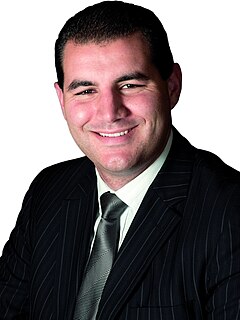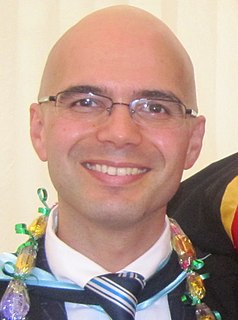United Future New Zealand, usually known as United Future, was a centrist political party in New Zealand. The party was in government between 2005 and 2017, first alongside Labour (2005–2008) and then supporting National (2008–2017).

The New Zealand electoral system has been mixed-member proportional (MMP) since the 1996 election. MMP was introduced following a referendum in 1993. It replaced the first-past-the-post (FPP) system New Zealand had previously used for most of its history. New Zealanders elect their members of parliament (MPs) with two votes. The first vote is for a candidate from an electorate. The second vote is used to elect ranked party lists.

Jami-Lee Matenga Ross is a New Zealand former politician who was the Member of Parliament (MP) for the Botany electorate in Auckland from the March 2011 Botany by-election, when he became the youngest MP at the time, until 2020. He was previously a local government politician on the Auckland Council and, before that, was on the Manukau City Council from the age of 18.
The Mana Movement, formerly known as the Mana Party, is an unregistered New Zealand political party led by Hone Harawira which was formed in April 2011 following his resignation from the Māori Party. Harawira won the by-election in Te Tai Tokerau of 25 June 2011 for the Mana Party and retained the seat during the 2011 general election, but lost it in 2014 and 2017 to Labour Party candidate Kelvin Davis.
New Conservative is a political party in New Zealand. Observers describe the party's policies as far-right, though the party itself disputes this. It advocates for lower taxation, anti-abortion measures, protection of freedom of speech, and austerity cuts.

The 2017 New Zealand general election took place on Saturday 23 September 2017 to determine the membership of the 52nd New Zealand Parliament. The previous parliament was elected on 20 September 2014 and was officially dissolved on 22 August 2017. Voters elected 120 members to the House of Representatives under New Zealand's mixed-member proportional (MMP) voting system, a proportional representation system in which 71 members were elected from single-member electorates and 49 members were elected from closed party lists. Around 3.57 million people were registered to vote in the election, with 2.63 million (79.8%) turning out. Advance voting proved popular, with 1.24 million votes cast before election day, more than the previous two elections combined.
The Ban 1080 Party was a political party in New Zealand that opposed the use of sodium fluoroacetate (1080) poison, which is widely used in New Zealand for controlling mammalian pests such as possums and rats. The party was founded in 2014 by Bill Wallace and its co-leaders were Bill Wallace and Mike Downard. The party was registered by the Electoral Commission in 2014 and deregistered in February 2018.

The Opportunities Party is a centrist political party based in New Zealand. It was founded in 2016 by economist and philanthropist Gareth Morgan. The party is based upon an idea of "evidence-based policy", with policy priorities of "Universal Basic Income (UBI)", "Affordable Housing and Rent", "Smart Small Business", and "Climate Friendly Recovery".

The 2020 New Zealand general election was held on Saturday 17 October 2020 to determine the composition of the 53rd parliament. Voters elected 120 members to the House of Representatives, 72 from single-member electorates and 48 from closed party lists. Two referendums, one on the personal use of cannabis and one on euthanasia, were also held on the same day. Official results of the election and referendums were released on 6 November.

The 2017 New Zealand general election was held on Saturday, 23 September 2017, to determine the membership of the 52nd New Zealand Parliament. Parliament has 120 seats, and 71 were filled by electorate MPs, with the remaining 49 from ranked party lists. Writ day, i.e. the day when the Governor-General issues a formal direction to the Electoral Commission to hold the election, was set for Wednesday, 23 August 2017. As stipulated in section 127 of the Electoral Act 1993, the writ will set a date by which registered parties must submit a "list of candidates for election to the seats reserved for those members of Parliament elected from lists". Party lists must have been submitted by Monday, 28 August, at noon. On Wednesday, 30 August, the Electoral Commission released details of candidates for election, party lists, and the polling places. This page lists candidates by party, including their ranking on a list.

Geoffrey Leonard Simmons is an economist and former leader of The Opportunities Party (TOP), a political party in New Zealand. He stood for TOP in the February 2017 Mount Albert by-election, in the Wellington Central electorate in the 2017 general election, and in the Rongotai electorate in the 2020 general election.

This page lists candidates contesting electorates in the 2020 New Zealand general election.

Vernon Ivan Tava is a barrister living in Auckland, New Zealand. He is the founder and leader of the Sustainable New Zealand Party and a former candidate for the Green Party of Aotearoa New Zealand.

The Advance New Zealand Party was a short-lived political party in New Zealand from 2020 to 2021. The idea was first unveiled in a newsletter from founder Jami-Lee Ross in April 2020. Ross has claimed that the party was a centrist and anti-corruption movement designed to appeal to voters "in the middle"; however, their main policies represent the political fringe rather than centre.

The One Party is a Christian fundamentalist political party in New Zealand, led by Edward Shanly and by Stephanie Harawira, an activist opposing synthetic drugs. The party states that New Zealand is a "Christian nation", and should be run as such. It opposes abortion and euthanasia. Harawira incorporated One Party Limited as a New Zealand limited company in September 2019.
The New Zealand TEA Party is a registered political party in New Zealand. The party is led by John Hong. The party contested the 2020 general election, but did not win any seats.
Heartland New Zealand is a New Zealand political party founded in 2020. The party is rural-based, and opposes the New Zealand Emissions Trading Scheme, the Paris Agreement, and attempts to limit the environmental impacts of agriculture. The party is led by former Franklin District mayor Mark Ball, who is the party's candidate for Port Waikato. It is backed by Hamilton entrepreneur Harry Mowbray, a billionaire who, with his siblings, was on the 2019 NBR Rich List.

The New Zealand Public Party was a political party in New Zealand led by Billy Te Kahika. It was founded in June 2020, and two months later became a component party of registered party Advance New Zealand in order to contest the 2020 election. Advance received only 1.0% of the party vote and neither Advance nor Public won any electorate seats, so the Public Party did not win any representation in Parliament. The Public Party split from Advance shortly after the election acrimoniously, and Public's party secretary and director both resigned in January 2021.

Jessica Hammond is a New Zealand public servant, politician, playwright, and blogger. Hammond stood for The Opportunities Party for Ōhāriu in the 2017 and 2020 general elections.
Susan Jane Grey is an environmental lawyer in Nelson, New Zealand, and the co-leader of the New Zealand Outdoors Party. She is known for promoting medicinal cannabis rights and opposing COVID-19 vaccination, 5G technology, and the use of 1080, frequently sharing misinformation on social media about the effectiveness of COVID vaccination.










